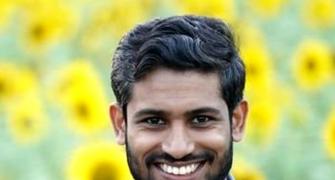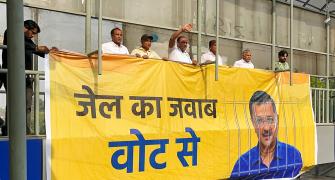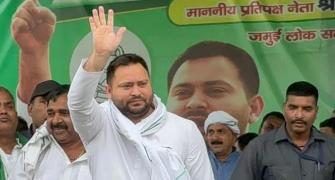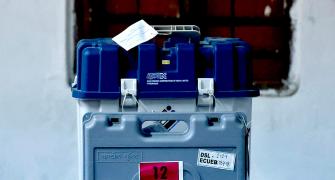We were speeding on a broad California highway and it was pitch dark early in the morning. Our destination Sacramento, the capital of the state of California was still a few hours away and Paul my American friend in the car suggested a coffee break. Actually more than that since like many Americans he was already hungry even before dawn and was ready to eat.
We came off the highway and soon found a donut shop, or doughnut shop to spell it correctly, ubiquitous in USA and the standard place for a quick breakfast and coffee. I don't know if you like the creamy sweetness of donuts or pastries so early after waking up. Having been brought up on a healthy diet of idlis or upma, I don't, but most Americans seem to like it.
Inside the shop, there were no customers, but two sales personnel, as they are referred to, representing both genders. Both Asians. Living in these parts, one begins to recognise different types of Asians, to discern by look some differences between Chinese, Japanese, Korean, Vietnamese, though one can never be sure. But these did not look like Chinese. They seemed shorter, shyer and less assured.
As the supply van which had unloaded a fresh batch of hot donuts drove away, they were heard talking in an unfamiliar tongue with the driver of the van and with each other.
"Which language are you speaking?" I asked with a smile. I am curious and inquisitive in situations like this.
"How many?" one of them replied pointing at the donuts.
"No. No. Is it Cantonese?" I repeated and saw bafflement and irritation on his face.
We had a few more rounds of utterly unsuccessful exchanges like this with the result that I was only learning that these donuts cost 60 cents, while the ones glazed and glistening in the back tray were at $1.29.
Meanwhile Paul who had gone around the corner came in, took in the scene, and told me not to trouble them with my enquiries any more.
"Don't harass these guys with your questions. Don't you know that they are Cambodians with very limited English?" he said.
"How would I know?" I replied.
"It is common knowledge. Donut shops in California are owned and manned by Cambodians. You should know that. It is like the Laundromats being run by the Koreans," he said.
I was struck by this sweeping generalisation about vocation and ethnic origin, though somewhat sceptical. More enquiries and research showed however that there is often a fascinating correlation between who you are as an immigrant American and what you do.
Why are donuts shops run largely by Cambodians? These are simple shops with limited fare, not really like restaurants, but running them is really hard work. Typically the donuts are baked/fried at midnight and brought into the shop by 3 am. A small family can manage the whole operation -- cook, deliver, sell, clean -- and can even buy a franchise for a modest investment. But the most important factor in our story is that this operation hardly requires any English.
Unlike any other customer oriented business based on labour -- laundry or drycleaning, hair-saloons or facials, or as you go up the value chain, groceries or pharmacies -- in the donut shop, you go in, point to what you need and say: 'I want six or a dozen'. Conversely, the salesperson merely has to point to the trays and ask: 'Which one -- this or that' and that is it.
This then is the entry level in America for hard working families, working together with no English, who are mainly the Asian immigrants. This is the mystery behind the Cambodian monopoly over the donut chains in California. They make some money, but not huge amounts and once they acquire more English, aspire to move up the chain.
There are many Asian-American communities and each has its characteristics. However, there are some common traits: hard work, family-orientation, propensity to save, a vision of a better tomorrow. Some other communities do not share these traits, but I will not get into that. There are today around 14 million Asian immigrants constituting almost 4.5 per cent of the US population.
The Chinese are the largest, the Philippine community perhaps the second largest and the Indians come third with a total of about two million now.
As I learnt all this I recalled from my university days something about Marx having said: 'From each according to his ability and to each according to his need.' America is not the land to recall Marx but I could see that in the Diaspora 'To each according to his English' had some relevance. Naturally this enables Indians to be at the top of the ladder among the Asian-Americans, at least for now. Studies of occupational patterns among Asian-Americans clearly show Indians leading in engineering, sciences and computers; Chinese in sales and support and Philippinos in medical and health care.
"What about the Indian tribes?" Paul asked jocularly, as we discussed all this in the car, albeit in not so analytical a manner. "What business do they excel in, apart from computers and call centres?" he asked.
"There are many Indian tribes and with different traits. I don't really know too many with family businesses," I began saying pedantically as we passed the sign of a Holiday-inn. Then it struck me. So obvious. The Patels and the Motels. It was my turn to tell Paul the phenomenal Patels-Motels-Hotels with which I had some familiarity from my own days in Uganda, years ago.
There is no integral link between Patels and Motels; nor between expulsion of Indians from Uganda under Idi Amin in the early 1970s and their migration and subsequent success in UK, Canada and the USA. Or is there? I have sometimes wondered.
The fact is that today people of Indian origin own over 60 per cent of the motel business in America and it is believed that the Patel community owns a major chunk of this. What accounts for it?
When the substantial Indian business community, predominantly Gujarati, got thrown out of Uganda in 1972 -- and that is another story -- many found their way to Western countries and had to start their lives anew. What they had was some capital, propensity for the family to work together and for long hours, an innate capacity to save, and inborn business acumen. And reasonable command over English.
The motel business requires long hours -- someone reliable at the desk for 24 hours, someone else to clean and get the rooms ready and some mastery over inventories and accounts. All this came naturally to the community. There was also the pull factor -- once someone has started a business others gravitate towards it. In short a combination of unique circumstances and aptitudes enabled them to triumph over all tribulations, if you pardon the alliteration.
Today the community is acquiring and consolidating the mid-size to higher end of the hotel chain and the congregations of AAHOA -- Asian American Hotel Owners Association --are glittering events in shiny palaces in Las Vegas. A long road from the rural roads of Uganda.
"Can't other Indian communities replicate this model of motel ownership?" Paul was asking.
"I don't know, I guess, they can", I said.
I remembered, however, once asking a really wealthy Sikh farmer as to why none of his sons thought of this profitable venture. "Punjabis cannot sit still," he said simply, "None of my sons will sit behind a register; they would rather ride a tractor or a truck". Different tribes-different traits.
I ended my exposition with my favourite story from Uganda.
There is this super-rich Mr Patel in Vancouver in Canada. Visitors to his huge mansion are shocked to see a large photograph of Idi Amin adorning the walls, next to the pictures of his parents and Gurus. Every day, Amin's photo is also duly garlanded and incense sticks offered.
'What is this? After all this man threw you out of the country and you worship him ?' curious visitors ask Mr Patel.
"Sometimes Bhagwan gives you a kick to elevate you. If this man had not thrown me out, I would today still be a small shopkeeper in Uganda," says Patel, now the owner of a chain of hotels and condominiums all over North America.
B S Prakash is India's Consul General in San Francisco and can be reached at cg@cgisf.org.







